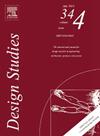非殖民化设计伦理——印度人对设计人工制品影响本质的看法
IF 3.2
1区 工程技术
Q2 ENGINEERING, MANUFACTURING
引用次数: 0
摘要
设计师在设计解决方案中越来越多地优先考虑道德,使用主要源自西方哲学但普遍应用的以道德为中心的方法(efm)。由于缺乏植根于非西方伦理哲学的efm,导致在设计伦理领域缺乏非西方哲学的代表。理解跨文化和哲学的伦理对于更广泛地理解伦理设计至关重要。本文回顾了Chivukula, Li, Pivonka, Chen, and Gray(2022)和Gray, Chivukula, Carlock, Li, and Duane(2023)先前研究的63种efm,确定了他们的理论基础和伦理方法,并提出将印度伦理纳入设计方法。通过使用印度的伦理观点,提出了一个理论框架,提高设计师的伦理观点,使更多的上下文相关和文化敏感的设计解决方案。本文章由计算机程序翻译,如有差异,请以英文原文为准。
Decolonising Design Ethics–An Indian view of the nature of impact of designed artefacts
Designers are increasingly prioritising ethics in their design solutions, utilizing Ethics-Focused Methods (EFMs) derived mainly from Occidental philosophies but applied universally. There's a dearth of EFMs rooted in non-Occidental ethical philosophies leading to a lack of representation of non-Occidental philosophies in the field of Design Ethics. Understanding ethics across cultures and philosophies is crucial for broader understanding of ethical design. This article provides a review of 63 EFMs previously studied by Chivukula, Li, Pivonka, Chen, and Gray (2022) and Gray, Chivukula, Carlock, Li, and Duane (2023), identifies their theoretical foundations and ethical approaches, and proposes integrating Indian Ethics into design methodologies. By using Indian ethical perspectives, a theoretical framework is proposed, enhancing designers' ethical perspectives and enabling more contextually relevant and culturally sensitive design solutions.
求助全文
通过发布文献求助,成功后即可免费获取论文全文。
去求助
来源期刊

Design Studies
工程技术-工程:制造
CiteScore
8.60
自引率
20.00%
发文量
41
审稿时长
40 days
期刊介绍:
Design Studies is a leading international academic journal focused on developing understanding of design processes. It studies design activity across all domains of application, including engineering and product design, architectural and urban design, computer artefacts and systems design. It therefore provides an interdisciplinary forum for the analysis, development and discussion of fundamental aspects of design activity, from cognition and methodology to values and philosophy.
Design Studies publishes work that is concerned with the process of designing, and is relevant to a broad audience of researchers, teachers and practitioners. We welcome original, scientific and scholarly research papers reporting studies concerned with the process of designing in all its many fields, or furthering the development and application of new knowledge relating to design process. Papers should be written to be intelligible and pertinent to a wide range of readership across different design domains. To be relevant for this journal, a paper has to offer something that gives new insight into or knowledge about the design process, or assists new development of the processes of designing.
 求助内容:
求助内容: 应助结果提醒方式:
应助结果提醒方式:


